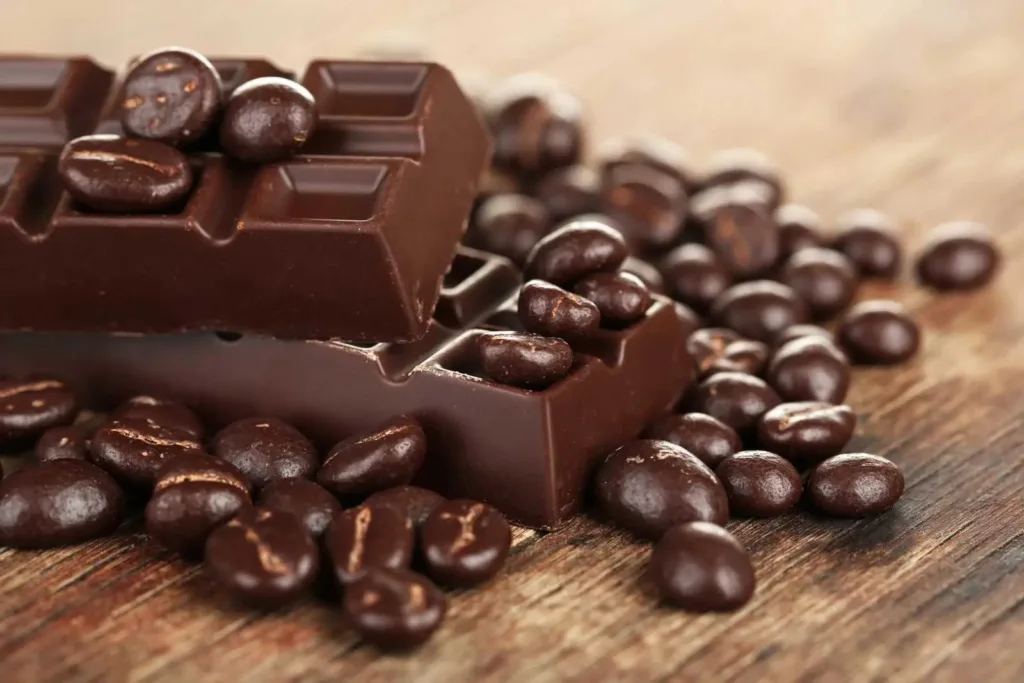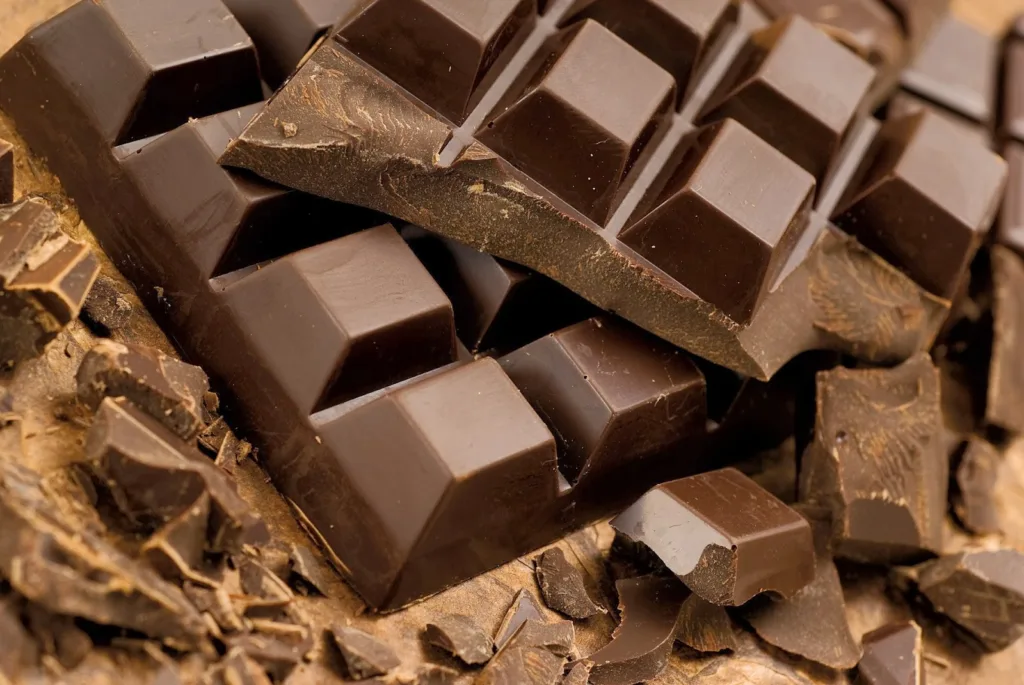Do you crave chocolate when you’re dieting? You’re not alone! The tantalizing taste of chocolate makes it hard to resist. But here’s a delicious secret – chocolate can actually help you lose weight!
Science reveals chocolate contains powerful compounds that ignite your metabolism for fat-burning, curb hunger, and even lift your mood. This metabolic magic makes chocolate a potential weight loss ally.
In this post, we’ll explore the research behind chocolate’s ability to boost weight loss. You’ll learn how chocolate impacts your appetite, metabolism, and health. Let’s indulge in the fascinating science of chocolate!

The Magic of Chocolate and Weight Loss
Not all chocolate is created equal when it comes to your health. The cocoa content determines the levels of weight loss-promoting compounds. Here’s a breakdown:
Dark chocolate contains at least 70% cocoa and is richest in cocoa flavanols. These plant nutrients enhance insulin sensitivity, reduce inflammation, and decrease fat absorption. The higher the cocoa percentage, the more potent the health effects.
Milk chocolate has a lower cocoa percentage around 40% and contains milk ingredients. The added sugars and fats make it less beneficial than dark chocolate. But it still offers some cocoa flavanols.
White chocolate lacks cocoa solids and contains mainly cocoa butter. Without cocoa’s active compounds, it does not provide the same weight loss advantages.
Cocoa flavanols are chocolate’s magical ingredients for weight loss. These antioxidant and anti-inflammatory compounds promote:
- Increased fat burning: Cocoa flavanols boost metabolism by igniting genes that trigger fat breakdown. Mice fed high-flavanol cocoa burned more fat despite equal calorie intake.
- Improved insulin sensitivity: Flavanols enhance the body’s responsiveness to insulin. Better blood sugar control assists weight management and reduces diabetes risk.
- Decreased fat absorption: Cocoa compounds limit the digestion and absorption of dietary fats and carbohydrates. Less absorbed fat equates to fewer calories retained.
Theobromine, a natural stimulant in chocolate, also helps weight loss. This compound boosts metabolism, mobilizes fat from cells, and may suppress appetite.
Now that’s some metabolic magic! Let’s see how chocolate also conquers cravings…

Chocolate’s Impact on Appetite and Satiety
Constant hunger and uncontrolled cravings sabotage many diets. Could a chocolate fix help? Science says yes!
Studies show chocolate consumption leads to increased satiety and reduced appetite. Participants reported feeling fuller and less prone to overeating after eating chocolate. There are several explanations:
- Slower digestion: The fat and fiber in chocolate promote satiety by slowing digestion. This sustained release of energy curbs hunger pangs.
- Appetite hormones: Chocolate interacts with ghrelin and peptide YY – hormones that control hunger signals. This biochemical influence results in appetite suppression.
- Nutrient effects: Chocolate provides protein, fiber, and fat to temper cravings. The combination of nutrients offers lasting energy.
Research also reveals the more chocolate you eat, the stronger the satiety effects. So savoring chocolate slowly maximizes satisfaction and prevents bingeing. That’s welcome news for dieters!
Cocoa compounds provide additional anti-hunger advantages. Flavanols interact with appetite regulation pathways in the brain. And theobromine regulates hormones like ghrelin linked to hunger.
By taming ravenous cravings, chocolate makes it easier to eat fewer calories and avoid overeating. A little chocolate goes a long way in controlling appetite for improved weight outcomes.
Balancing Calories with Chocolate
Chocolate certainly makes dieting more delicious. But to reap the weight loss benefits, portion control remains key.
While chocolate aids satiety, the calories still count. A 3-ounce bar of 60-70% dark chocolate has around 500 calories – almost a quarter of a typical day’s intake!
Keep portions small – a square or two of chocolate (1 ounce or less) offers satisfaction without excess calories. This occasional treat prevents feelings of deprivation while limiting calorie load.
Additionally, balance chocolate with nutrient-dense foods like fruits, vegetables, and lean proteins. Chocolate paired with an overall healthy diet provides the best opportunity for weight loss success.
Here are more tips for keeping chocolate consumption waistline-friendly:
- Opt for small, individually wrapped dark chocolate pieces. This makes portioning easier.
- Savor chocolate slowly instead of mindlessly snacking on a whole bar.
- Choose chocolate with at least 70% cocoa for maximum nutrients with less sugar.
- Avoid excessive chocolate late at night so calories don’t overwhelm your daily intake.
By carefully planning your chocolate indulgences, you can satisfy cravings without the weight gain!

Chocolate and Metabolic Health
Emerging research reveals chocolate might enhance overall metabolic health too. Let’s analyze the compelling evidence:
Cocoa flavanols ramp up the body’s metabolism by influencing insulin activity, glucose absorption, fat breakdown, and energy production pathways. These systemic effects promote:
- Increased insulin sensitivity: Cocoa compounds improve cells’ responsiveness to insulin. This assists weight management by stabilizing blood sugar.
- Lower blood sugar levels: Flavanols boost insulin production and trigger the release of insulin from cells. This enhances glucose regulation.
- Reduced diabetes risk: Better blood sugar control lowers diabetes risk. Chocolate consumption shows promising results for reducing diabetes development.
- Decreased fat accumulation: By limiting fat absorption and increasing fat metabolism, cocoa bioactives help prevent fat accumulation and related obesity.
- Improved metabolic parameters: Clinical studies reveal chocolate and cocoa extracts can lower insulin resistance, bad cholesterol, and blood pressure – all factors in metabolic health.
By optimizing metabolism and blood sugar control, chocolate provides synergistic weight loss and health effects for overall wellbeing.
The Dark Chocolate vs. Milk Chocolate Debate
With chocolate’s impressive resume for weight management, how do different types compare? Let’s settle the dark vs. milk chocolate debate.
Dark chocolate reigns supreme for weight loss due to:
- Higher cocoa content: With at least 70% cocoa, dark chocolate packs more metabolism-boosting flavanols and less fat and sugar.
- Lower calorie density: The higher cocoa percentage equates to a less calorie-dense sweet treat. More cocoa means fewer calories by volume.
- Better appetite control: Dark chocolate promotes improved satiety compared to milk chocolate in research studies. The intense cocoa taste provides greater satisfaction.
However, milk chocolate still offers some benefits through its cocoa compounds. And the added milk ingredients provide protein for satiety.
Just opt for higher quality milk chocolate with at least 30% cocoa and minimal unhealthy additives. Watch your servings since the extra calories and sugar add up quickly.
For the biggest metabolic boost, choose high percentage dark chocolate with 80% cocoa or above. The richer the chocolate, the greater the weight loss effects!
Chocolate as a Mood Booster
Can chocolate lift your mood while losing weight? Science confirms chocolate has psychoactive properties that make you feel good!
Study participants reported increased positive emotions like contentment and calmness after eating chocolate. Neuroimaging scans reveal chocolate activates areas of the brain linked to pleasure and rewards.
Two key chemicals in chocolate contribute to these mood-enhancing effects:
- Phenylethylamine triggers the release of feel-good endorphins and dopamine. This compound plays a role in the euphoric sensation induced by chocolate.
- Anandamide binds to cannabinoid receptors in the brain similar to the active component in cannabis. This leads to relaxation and blissful feelings.
By reducing stress and inducing feelings of joy, chocolate’s mood-boosting abilities can support weight loss. Stress causes hormonal changes that promote weight gain and makes dietary adherence challenging.
Chocolate’s psychological lift keeps you feeling optimistic and motivated on your health journey. An occasional indulgence provides comfort without derailing your progress. So go ahead and reward yourself with a chocolate break!

Conclusion
Who knew chocolate could be a weight loss ally? But science supports chocolate’s metabolic magic through:
- Increased fat-burning and energy expenditure
- Decreased appetite and hunger
- Improved glucose regulation and insulin sensitivity
- Enhanced satiety and mood
While chocolate is high in calories, the cocoa flavanols provide real health-promoting and weight loss benefits. Just remember to opt for high quality dark chocolate and watch your serving size.
Chocolate will always be an indulgence worth savoring. But by understanding the science, you can now feel good about enjoying the occasional chocolate treat, guilt-free!
So embrace chocolate’s place in a balanced diet and let it be your delicious metabolic secret for boosting weight loss success. Those enticing weight management effects give you permission to have your chocolate and lose weight too!
Thank you for reading! Let me know if you found this chocolate info useful. And don’t forget to subscribe to our newsletter for more captivating nutrition and health insights! I aim to provide the latest scientific research and actionable tips to optimize your wellbeing and empower your health journey. Additionally, explore more of our science-backed posts on achieving your weight goals through lifestyle, diet and mindset. Wishing you delicious health ahead!
Thank you for reading this post, don't forget to subscribe to our free newsletter
!
